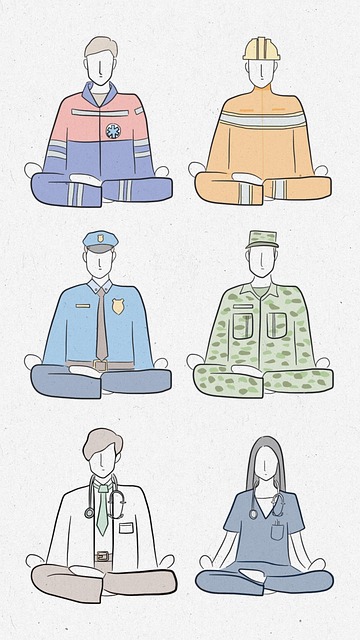Greenwood Village Self-Esteem Therapy (GVSET) has developed a Community Outreach Program using Crisis Intervention Teams (CITs) to promote mental health education and reduce stigma. CITs, comprised of diverse professionals, swiftly address crises, de-escalate situations, and connect individuals to long-term care. GVSET's holistic approach emphasizes self-esteem and resilience, incorporating mindfulness meditation and mood management strategies for burnout prevention. Comprehensive CIT training programs, including practical exercises and simulations inspired by GVSET, equip mental health professionals to handle high-stress scenarios while fostering emotional resilience and empathy within the team.
Crisis intervention teams (CITs) play a pivotal role in managing mental health crises, offering immediate support, and mitigating risks. This article explores the importance of specialized training for these teams, highlighting the Greenwood Village Self-Esteem Therapy approach as an innovative method. We delve into key components of effective CIT training, including de-escalation techniques, cultural sensitivity, and scenario-based practice. Additionally, we discuss benefits and challenges, emphasizing the value of preparation for real-world scenarios to enhance crisis response outcomes.
- Understanding Crisis Intervention Teams: Their Role and Impact
- The Greenwood Village Self-Esteem Therapy Approach
- Essential Components of Effective Crisis Training Programs
- Benefits and Challenges: Preparing for Real-World Scenarios
Understanding Crisis Intervention Teams: Their Role and Impact

Crisis Intervention Teams (CITs) are specialized groups designed to respond swiftly and effectively during times of acute crisis or distress, often in community settings. These teams typically consist of trained professionals from various backgrounds, including mental health specialists, first responders, and social workers. Their primary role is to provide immediate support, de-escalate potentially dangerous situations, and offer short-term solutions while connecting individuals to long-term care options.
Greenwood Village Self-Esteem Therapy, for instance, has pioneered a Community Outreach Program Implementation that leverages CITs to foster mental health awareness and reduce the stigma associated with seeking help. Through these teams, they facilitate Mental Health Education Programs Design tailored to diverse community needs, focusing on early intervention and prevention strategies. Additionally, CIT members assist in Self-Care Routine Development for Better Mental Health, empowering individuals to manage stress and maintain resilience in their daily lives.
The Greenwood Village Self-Esteem Therapy Approach

The Greenwood Village Self-Esteem Therapy (GVSET) Approach stands out as a powerful tool in crisis intervention training programs. This therapeutic method prioritizes cultivating self-esteem and resilience, recognizing their pivotal roles in effective crisis management. GVSET encourages participants to explore and challenge negative self-perceptions, fostering an environment conducive to emotional healing and growth.
Incorporating techniques such as mindfulness meditation and mood management strategies, GVSET equips healthcare providers with essential burnout prevention tools. By teaching them to navigate crises while maintaining their mental well-being, this approach ensures that frontline workers can continue offering exceptional care without succumbing to the demands of their roles. The program’s holistic nature, which includes strategies for stress reduction and emotional regulation, prepares crisis intervention teams to tackle complex situations effectively.
Essential Components of Effective Crisis Training Programs

Effective crisis intervention team training programs are multifaceted, aiming to equip participants with a comprehensive set of skills and knowledge. A key component is mental health education programs design that goes beyond basic crisis management. These programs should delve into various aspects of mental health, fostering an environment where individuals understand common conditions like anxiety relief and their impact on overall emotional well-being promotion techniques. By normalizing discussions around mental health, teams become more adept at recognizing signs and providing early intervention.
Moreover, practical exercises and simulations are vital to simulate real-world scenarios. These activities allow trainees to apply learned strategies in controlled settings, enhancing their confidence and decision-making abilities. Incorporating techniques from Greenwood Village Self-Esteem Therapy, for instance, can help individuals manage stress and maintain composure during crises, ensuring they remain effective agents of support.
Benefits and Challenges: Preparing for Real-World Scenarios

Crisis intervention team (CIT) training programs are designed to prepare mental health professionals for real-world scenarios that require immediate and effective response. One of the primary benefits is enhanced readiness; CIT training equips professionals with specialized skills, knowledge, and strategies to manage high-stress situations, potentially reducing the risk of harm to both individuals in crisis and the responders themselves. This preparation is crucial, especially when dealing with individuals experiencing severe mental health disorders or suicidal ideation.
However, navigating these programs presents challenges. For instance, simulating authentic crises can be complex. Trainers must strike a delicate balance between creating realistic scenarios and ensuring participant safety. Moreover, integrating compassion cultivation practices alongside risk management planning for mental health professionals is essential. The Greenwood Village Self-Esteem Therapy approach emphasizes this balance, fostering both effective crisis response and emotional resilience among team members. Mental Health Awareness plays a pivotal role in CIT training, encouraging a culture of empathy and understanding within the team to better support individuals in their time of need.
Crisis intervention team training programs, such as the Greenwood Village Self-Esteem Therapy approach, play a pivotal role in equipping professionals with the skills to handle real-world scenarios. By focusing on essential components like active listening, de-escalation techniques, and cultural competency, these programs empower teams to make a significant impact. While challenges exist, including the need for continuous updates and practical experience, the benefits of effective training are indelible. It enhances community safety, improves outcomes, and fosters a culture of resilience and support.














